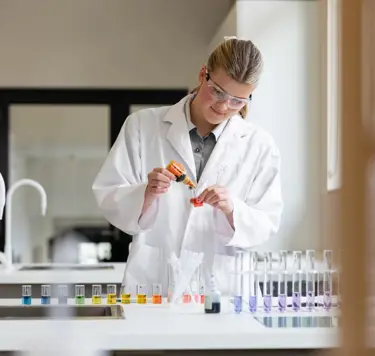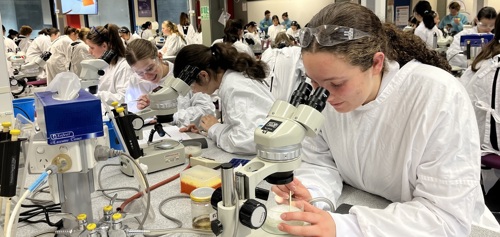Science in action: MLC's hands-on learning and University of Melbourne workshops
August 30th, 2024

August 30th, 2024
MLC has championed science for girls since its foundation, as reflected in the stained-glass windows in the Tiddeman Boarding House, designed by distinguished architect, J Edmund Burke. The three-paneled window, which showcases the study of music on the left and science on the right, was designed to inspire students to a diverse range subjects.

Another prime example of these enriching experiences is MLC’s longstanding partnership with the School of BioSciences at the University of Melbourne. For over 12 years, this collaboration has provided invaluable workshops tailored to the curriculum, enhancing students’ understanding of complex scientific concepts.
Recently, IB and VCE Biology students participated in a practical workshop with the School of BioSciences at the University of Melbourne’s Parkville campus. The workshop, led by a University demonstrator, featured two fast-paced activities designed to deepen students grasp of evolutionary biology and immunology, while being exposed to new equipment. The workshop closely aligned with the curriculum, reinforcing classroom learning.
“Attending workshops, such as the one at the School of Biosciences at the University of Melbourne, provides students with valuable learning opportunities,” says Rachael Rutkowski, MLC’s Acting Head of Science. “Not only do they perform experimental work using techniques and equipment not usually found in schools, but they also experience working in a tertiary level laboratory.”
In the first activity, students investigated evolutionary changes using Drosophila melanogaster (fruit flies). They analysed ratios of wild-type and mutant fruit flies across 15 generations to assess how mutations impact survival.
The second activity focused on immunity and influenza. Students used an Enzyme-Linked ImmunoSorbent Assay (ELISA) to measure anti-influenza antibodies in samples, simulating a population’s response to flu vaccinations.
The workshop concluded with a discussion on immunity and the critical role of annual vaccinations, reinforcing the practical and theoretical knowledge gained during the session.
Rachael also highlights the importance of these workshops in offering students’ unique insights into university life, saying “In talking with their PhD- and Masters-level demonstrators they can find out about university life and the exciting research projects these students are undertaking. Being physically on campus allows students to imagine themselves as university students, inspiring and motivating them to pursue further studies.”
